HI5015 - Legal Aspects of International Business: Bank Analysis
VerifiedAdded on 2024/07/29
|9
|2322
|251
Report
AI Summary
This report provides a comprehensive analysis of the legal aspects of Commonwealth Bank of Australia's international business operations. It examines key legislations such as the Reserve Bank Act 1959, the Banking Act 1959, the Corporations Act 2001, and the Australian Securities and Investments Commission Act 2001, highlighting their impact on the bank's operations. The report also discusses the significance of international treaties and agreements, including the agreement with Austrade for fintech innovation and the China-Australia Free Trade Agreement (ChAFTA), detailing how these agreements facilitate the bank's international activities and market access. Furthermore, it emphasizes the bank's compliance with various laws and regulations to ensure fair business practices and customer protection. Desklib offers a platform to access similar solved assignments and study resources for students.
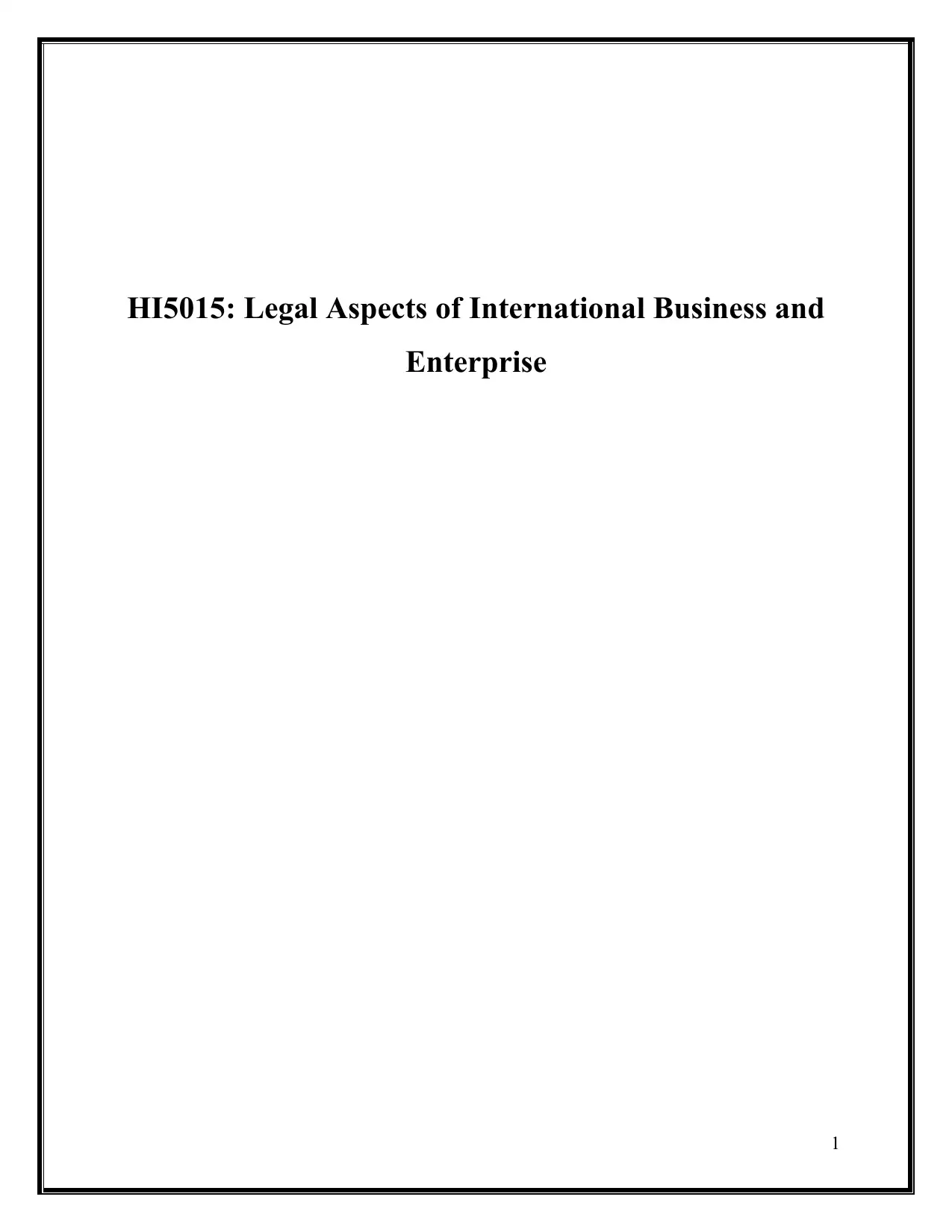
HI5015: Legal Aspects of International Business and
Enterprise
1
Enterprise
1
Paraphrase This Document
Need a fresh take? Get an instant paraphrase of this document with our AI Paraphraser

Contents
Question 1........................................................................................................................................ 3
Question 2........................................................................................................................................ 4
Question 3........................................................................................................................................ 7
References........................................................................................................................................9
2
Question 1........................................................................................................................................ 3
Question 2........................................................................................................................................ 4
Question 3........................................................................................................................................ 7
References........................................................................................................................................9
2
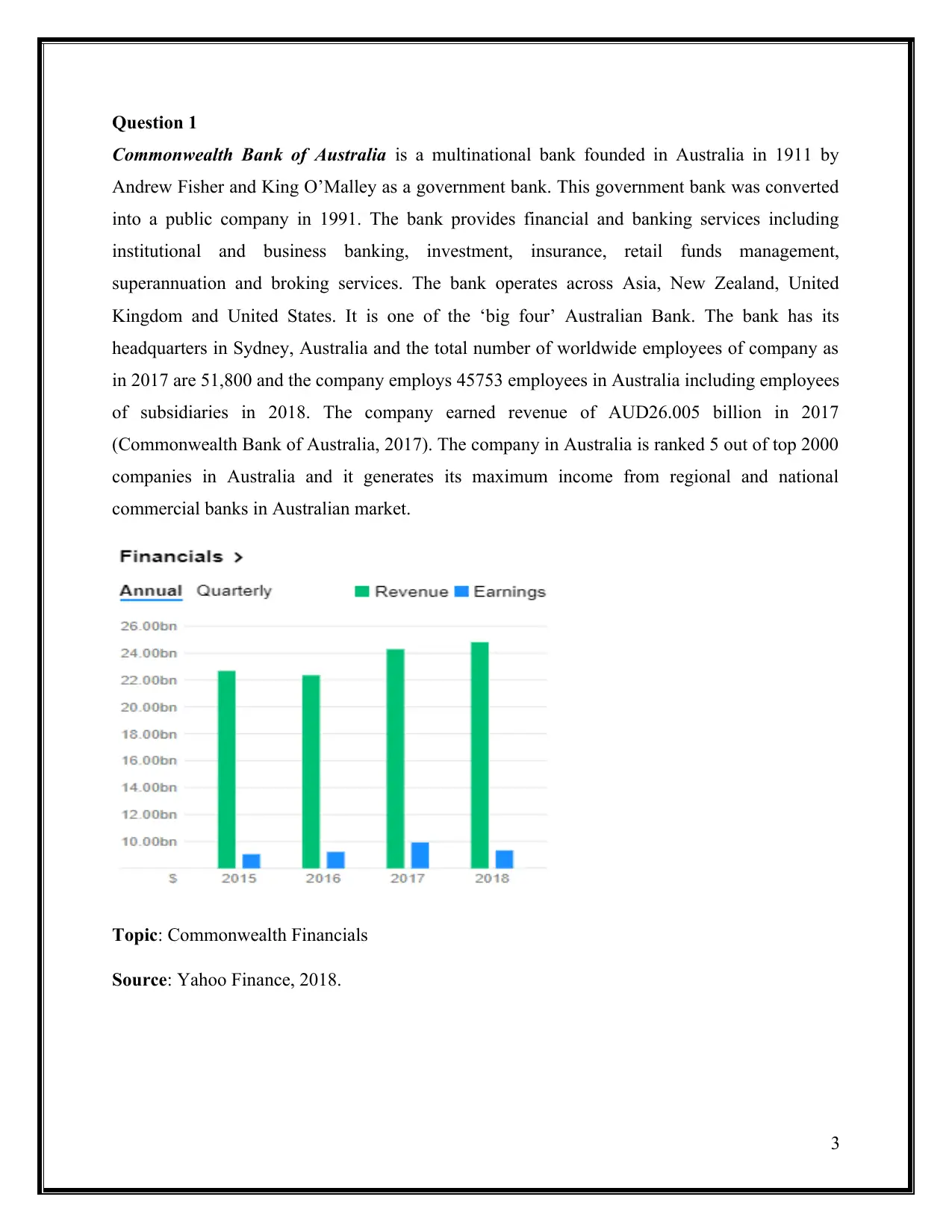
Question 1
Commonwealth Bank of Australia is a multinational bank founded in Australia in 1911 by
Andrew Fisher and King O’Malley as a government bank. This government bank was converted
into a public company in 1991. The bank provides financial and banking services including
institutional and business banking, investment, insurance, retail funds management,
superannuation and broking services. The bank operates across Asia, New Zealand, United
Kingdom and United States. It is one of the ‘big four’ Australian Bank. The bank has its
headquarters in Sydney, Australia and the total number of worldwide employees of company as
in 2017 are 51,800 and the company employs 45753 employees in Australia including employees
of subsidiaries in 2018. The company earned revenue of AUD26.005 billion in 2017
(Commonwealth Bank of Australia, 2017). The company in Australia is ranked 5 out of top 2000
companies in Australia and it generates its maximum income from regional and national
commercial banks in Australian market.
Topic: Commonwealth Financials
Source: Yahoo Finance, 2018.
3
Commonwealth Bank of Australia is a multinational bank founded in Australia in 1911 by
Andrew Fisher and King O’Malley as a government bank. This government bank was converted
into a public company in 1991. The bank provides financial and banking services including
institutional and business banking, investment, insurance, retail funds management,
superannuation and broking services. The bank operates across Asia, New Zealand, United
Kingdom and United States. It is one of the ‘big four’ Australian Bank. The bank has its
headquarters in Sydney, Australia and the total number of worldwide employees of company as
in 2017 are 51,800 and the company employs 45753 employees in Australia including employees
of subsidiaries in 2018. The company earned revenue of AUD26.005 billion in 2017
(Commonwealth Bank of Australia, 2017). The company in Australia is ranked 5 out of top 2000
companies in Australia and it generates its maximum income from regional and national
commercial banks in Australian market.
Topic: Commonwealth Financials
Source: Yahoo Finance, 2018.
3
⊘ This is a preview!⊘
Do you want full access?
Subscribe today to unlock all pages.

Trusted by 1+ million students worldwide
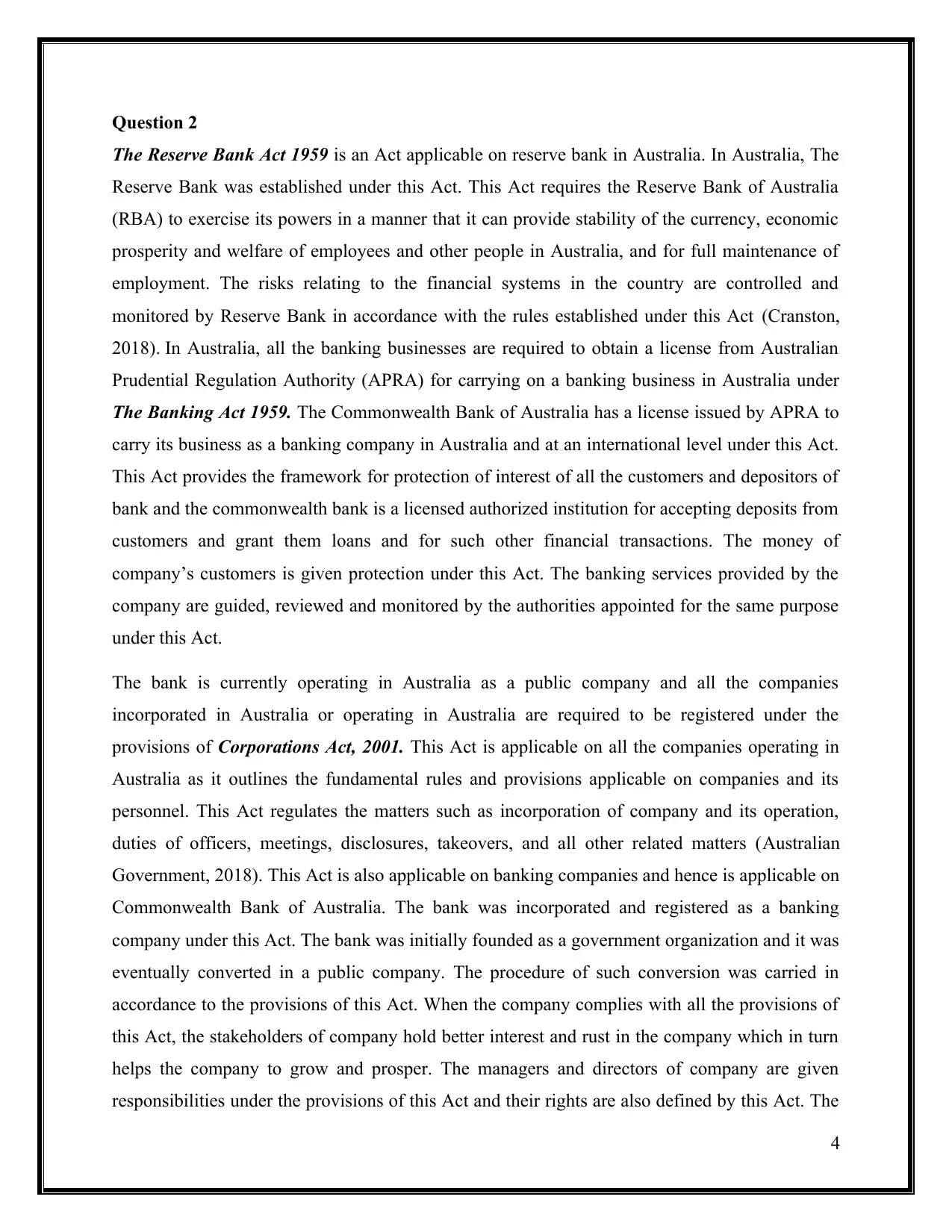
Question 2
The Reserve Bank Act 1959 is an Act applicable on reserve bank in Australia. In Australia, The
Reserve Bank was established under this Act. This Act requires the Reserve Bank of Australia
(RBA) to exercise its powers in a manner that it can provide stability of the currency, economic
prosperity and welfare of employees and other people in Australia, and for full maintenance of
employment. The risks relating to the financial systems in the country are controlled and
monitored by Reserve Bank in accordance with the rules established under this Act (Cranston,
2018). In Australia, all the banking businesses are required to obtain a license from Australian
Prudential Regulation Authority (APRA) for carrying on a banking business in Australia under
The Banking Act 1959. The Commonwealth Bank of Australia has a license issued by APRA to
carry its business as a banking company in Australia and at an international level under this Act.
This Act provides the framework for protection of interest of all the customers and depositors of
bank and the commonwealth bank is a licensed authorized institution for accepting deposits from
customers and grant them loans and for such other financial transactions. The money of
company’s customers is given protection under this Act. The banking services provided by the
company are guided, reviewed and monitored by the authorities appointed for the same purpose
under this Act.
The bank is currently operating in Australia as a public company and all the companies
incorporated in Australia or operating in Australia are required to be registered under the
provisions of Corporations Act, 2001. This Act is applicable on all the companies operating in
Australia as it outlines the fundamental rules and provisions applicable on companies and its
personnel. This Act regulates the matters such as incorporation of company and its operation,
duties of officers, meetings, disclosures, takeovers, and all other related matters (Australian
Government, 2018). This Act is also applicable on banking companies and hence is applicable on
Commonwealth Bank of Australia. The bank was incorporated and registered as a banking
company under this Act. The bank was initially founded as a government organization and it was
eventually converted in a public company. The procedure of such conversion was carried in
accordance to the provisions of this Act. When the company complies with all the provisions of
this Act, the stakeholders of company hold better interest and rust in the company which in turn
helps the company to grow and prosper. The managers and directors of company are given
responsibilities under the provisions of this Act and their rights are also defined by this Act. The
4
The Reserve Bank Act 1959 is an Act applicable on reserve bank in Australia. In Australia, The
Reserve Bank was established under this Act. This Act requires the Reserve Bank of Australia
(RBA) to exercise its powers in a manner that it can provide stability of the currency, economic
prosperity and welfare of employees and other people in Australia, and for full maintenance of
employment. The risks relating to the financial systems in the country are controlled and
monitored by Reserve Bank in accordance with the rules established under this Act (Cranston,
2018). In Australia, all the banking businesses are required to obtain a license from Australian
Prudential Regulation Authority (APRA) for carrying on a banking business in Australia under
The Banking Act 1959. The Commonwealth Bank of Australia has a license issued by APRA to
carry its business as a banking company in Australia and at an international level under this Act.
This Act provides the framework for protection of interest of all the customers and depositors of
bank and the commonwealth bank is a licensed authorized institution for accepting deposits from
customers and grant them loans and for such other financial transactions. The money of
company’s customers is given protection under this Act. The banking services provided by the
company are guided, reviewed and monitored by the authorities appointed for the same purpose
under this Act.
The bank is currently operating in Australia as a public company and all the companies
incorporated in Australia or operating in Australia are required to be registered under the
provisions of Corporations Act, 2001. This Act is applicable on all the companies operating in
Australia as it outlines the fundamental rules and provisions applicable on companies and its
personnel. This Act regulates the matters such as incorporation of company and its operation,
duties of officers, meetings, disclosures, takeovers, and all other related matters (Australian
Government, 2018). This Act is also applicable on banking companies and hence is applicable on
Commonwealth Bank of Australia. The bank was incorporated and registered as a banking
company under this Act. The bank was initially founded as a government organization and it was
eventually converted in a public company. The procedure of such conversion was carried in
accordance to the provisions of this Act. When the company complies with all the provisions of
this Act, the stakeholders of company hold better interest and rust in the company which in turn
helps the company to grow and prosper. The managers and directors of company are given
responsibilities under the provisions of this Act and their rights are also defined by this Act. The
4
Paraphrase This Document
Need a fresh take? Get an instant paraphrase of this document with our AI Paraphraser
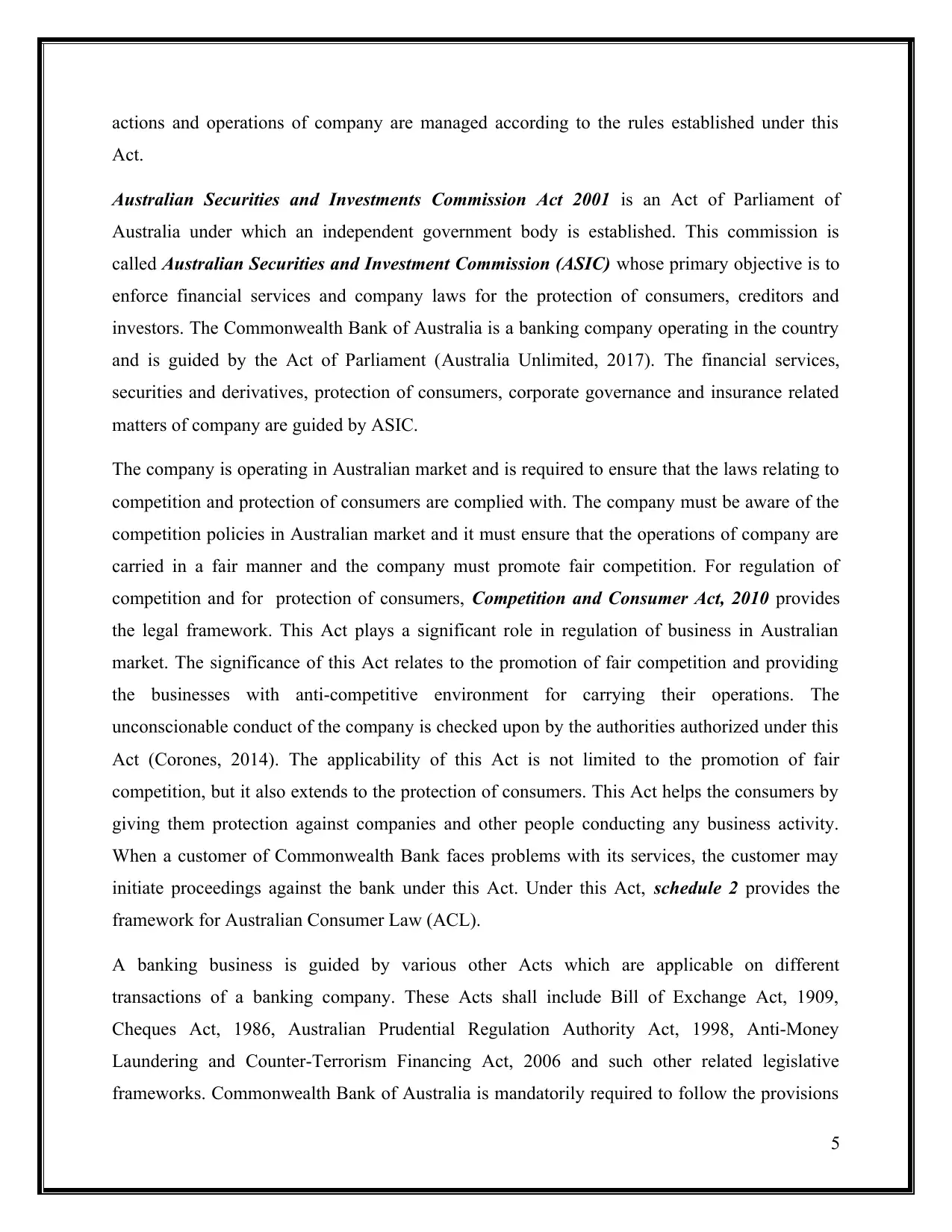
actions and operations of company are managed according to the rules established under this
Act.
Australian Securities and Investments Commission Act 2001 is an Act of Parliament of
Australia under which an independent government body is established. This commission is
called Australian Securities and Investment Commission (ASIC) whose primary objective is to
enforce financial services and company laws for the protection of consumers, creditors and
investors. The Commonwealth Bank of Australia is a banking company operating in the country
and is guided by the Act of Parliament (Australia Unlimited, 2017). The financial services,
securities and derivatives, protection of consumers, corporate governance and insurance related
matters of company are guided by ASIC.
The company is operating in Australian market and is required to ensure that the laws relating to
competition and protection of consumers are complied with. The company must be aware of the
competition policies in Australian market and it must ensure that the operations of company are
carried in a fair manner and the company must promote fair competition. For regulation of
competition and for protection of consumers, Competition and Consumer Act, 2010 provides
the legal framework. This Act plays a significant role in regulation of business in Australian
market. The significance of this Act relates to the promotion of fair competition and providing
the businesses with anti-competitive environment for carrying their operations. The
unconscionable conduct of the company is checked upon by the authorities authorized under this
Act (Corones, 2014). The applicability of this Act is not limited to the promotion of fair
competition, but it also extends to the protection of consumers. This Act helps the consumers by
giving them protection against companies and other people conducting any business activity.
When a customer of Commonwealth Bank faces problems with its services, the customer may
initiate proceedings against the bank under this Act. Under this Act, schedule 2 provides the
framework for Australian Consumer Law (ACL).
A banking business is guided by various other Acts which are applicable on different
transactions of a banking company. These Acts shall include Bill of Exchange Act, 1909,
Cheques Act, 1986, Australian Prudential Regulation Authority Act, 1998, Anti-Money
Laundering and Counter-Terrorism Financing Act, 2006 and such other related legislative
frameworks. Commonwealth Bank of Australia is mandatorily required to follow the provisions
5
Act.
Australian Securities and Investments Commission Act 2001 is an Act of Parliament of
Australia under which an independent government body is established. This commission is
called Australian Securities and Investment Commission (ASIC) whose primary objective is to
enforce financial services and company laws for the protection of consumers, creditors and
investors. The Commonwealth Bank of Australia is a banking company operating in the country
and is guided by the Act of Parliament (Australia Unlimited, 2017). The financial services,
securities and derivatives, protection of consumers, corporate governance and insurance related
matters of company are guided by ASIC.
The company is operating in Australian market and is required to ensure that the laws relating to
competition and protection of consumers are complied with. The company must be aware of the
competition policies in Australian market and it must ensure that the operations of company are
carried in a fair manner and the company must promote fair competition. For regulation of
competition and for protection of consumers, Competition and Consumer Act, 2010 provides
the legal framework. This Act plays a significant role in regulation of business in Australian
market. The significance of this Act relates to the promotion of fair competition and providing
the businesses with anti-competitive environment for carrying their operations. The
unconscionable conduct of the company is checked upon by the authorities authorized under this
Act (Corones, 2014). The applicability of this Act is not limited to the promotion of fair
competition, but it also extends to the protection of consumers. This Act helps the consumers by
giving them protection against companies and other people conducting any business activity.
When a customer of Commonwealth Bank faces problems with its services, the customer may
initiate proceedings against the bank under this Act. Under this Act, schedule 2 provides the
framework for Australian Consumer Law (ACL).
A banking business is guided by various other Acts which are applicable on different
transactions of a banking company. These Acts shall include Bill of Exchange Act, 1909,
Cheques Act, 1986, Australian Prudential Regulation Authority Act, 1998, Anti-Money
Laundering and Counter-Terrorism Financing Act, 2006 and such other related legislative
frameworks. Commonwealth Bank of Australia is mandatorily required to follow the provisions
5

of these Acts and other related Act applicable on banking in Australia to avoid any legal
consequences and to carry on its business in fair manner and provide the customers with fair
dealings and services.
6
consequences and to carry on its business in fair manner and provide the customers with fair
dealings and services.
6
⊘ This is a preview!⊘
Do you want full access?
Subscribe today to unlock all pages.

Trusted by 1+ million students worldwide
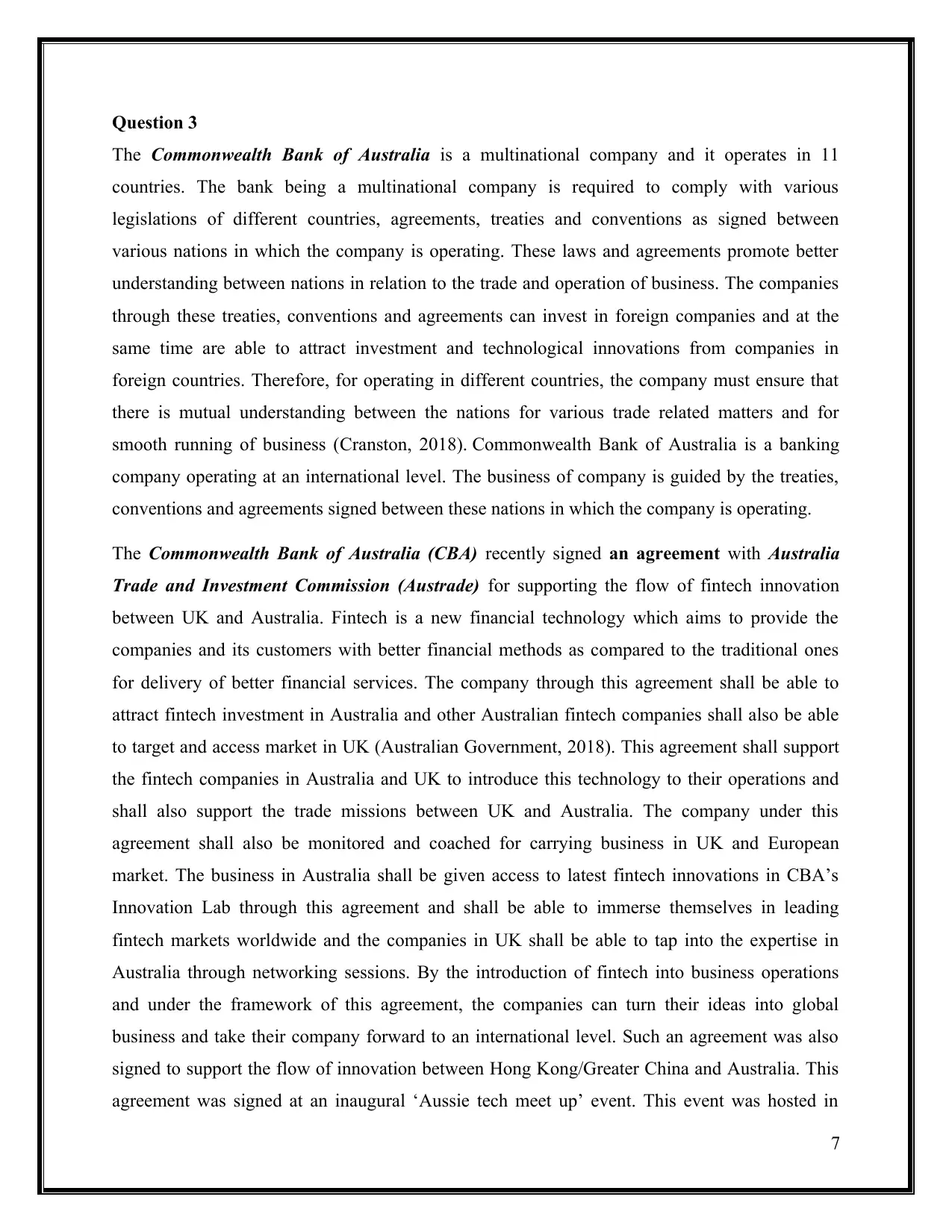
Question 3
The Commonwealth Bank of Australia is a multinational company and it operates in 11
countries. The bank being a multinational company is required to comply with various
legislations of different countries, agreements, treaties and conventions as signed between
various nations in which the company is operating. These laws and agreements promote better
understanding between nations in relation to the trade and operation of business. The companies
through these treaties, conventions and agreements can invest in foreign companies and at the
same time are able to attract investment and technological innovations from companies in
foreign countries. Therefore, for operating in different countries, the company must ensure that
there is mutual understanding between the nations for various trade related matters and for
smooth running of business (Cranston, 2018). Commonwealth Bank of Australia is a banking
company operating at an international level. The business of company is guided by the treaties,
conventions and agreements signed between these nations in which the company is operating.
The Commonwealth Bank of Australia (CBA) recently signed an agreement with Australia
Trade and Investment Commission (Austrade) for supporting the flow of fintech innovation
between UK and Australia. Fintech is a new financial technology which aims to provide the
companies and its customers with better financial methods as compared to the traditional ones
for delivery of better financial services. The company through this agreement shall be able to
attract fintech investment in Australia and other Australian fintech companies shall also be able
to target and access market in UK (Australian Government, 2018). This agreement shall support
the fintech companies in Australia and UK to introduce this technology to their operations and
shall also support the trade missions between UK and Australia. The company under this
agreement shall also be monitored and coached for carrying business in UK and European
market. The business in Australia shall be given access to latest fintech innovations in CBA’s
Innovation Lab through this agreement and shall be able to immerse themselves in leading
fintech markets worldwide and the companies in UK shall be able to tap into the expertise in
Australia through networking sessions. By the introduction of fintech into business operations
and under the framework of this agreement, the companies can turn their ideas into global
business and take their company forward to an international level. Such an agreement was also
signed to support the flow of innovation between Hong Kong/Greater China and Australia. This
agreement was signed at an inaugural ‘Aussie tech meet up’ event. This event was hosted in
7
The Commonwealth Bank of Australia is a multinational company and it operates in 11
countries. The bank being a multinational company is required to comply with various
legislations of different countries, agreements, treaties and conventions as signed between
various nations in which the company is operating. These laws and agreements promote better
understanding between nations in relation to the trade and operation of business. The companies
through these treaties, conventions and agreements can invest in foreign companies and at the
same time are able to attract investment and technological innovations from companies in
foreign countries. Therefore, for operating in different countries, the company must ensure that
there is mutual understanding between the nations for various trade related matters and for
smooth running of business (Cranston, 2018). Commonwealth Bank of Australia is a banking
company operating at an international level. The business of company is guided by the treaties,
conventions and agreements signed between these nations in which the company is operating.
The Commonwealth Bank of Australia (CBA) recently signed an agreement with Australia
Trade and Investment Commission (Austrade) for supporting the flow of fintech innovation
between UK and Australia. Fintech is a new financial technology which aims to provide the
companies and its customers with better financial methods as compared to the traditional ones
for delivery of better financial services. The company through this agreement shall be able to
attract fintech investment in Australia and other Australian fintech companies shall also be able
to target and access market in UK (Australian Government, 2018). This agreement shall support
the fintech companies in Australia and UK to introduce this technology to their operations and
shall also support the trade missions between UK and Australia. The company under this
agreement shall also be monitored and coached for carrying business in UK and European
market. The business in Australia shall be given access to latest fintech innovations in CBA’s
Innovation Lab through this agreement and shall be able to immerse themselves in leading
fintech markets worldwide and the companies in UK shall be able to tap into the expertise in
Australia through networking sessions. By the introduction of fintech into business operations
and under the framework of this agreement, the companies can turn their ideas into global
business and take their company forward to an international level. Such an agreement was also
signed to support the flow of innovation between Hong Kong/Greater China and Australia. This
agreement was signed at an inaugural ‘Aussie tech meet up’ event. This event was hosted in
7
Paraphrase This Document
Need a fresh take? Get an instant paraphrase of this document with our AI Paraphraser

Hong Kong Innovation Lab and the agreement signed in the event helped the Australian banking
and financial companies in getting better access to innovative technology and market
(Commonwealth Bank of Australia, 2017).
The financial sector of Australia is continuously evolving. The sector is driven by the need of
better connection and relations with global financial markets and therefore the focus of
Australia’s reform agenda is on risk management, cross-border investment, rate liberalization
and capital account convertibility. The transformation of the financial system and capital markets
is seeking to meet the requirements of customers belonging to all classes and business
organizations at both national and international level. The opportunities of financial sector are
enhanced and explored by China-Australia Free Trade Agreement (ChAFTA). This agreement
provides better market access in areas of insurance, banking, finance, funds management, futures
and securities (Wilson, 2015). This agreement has brought up new opportunities for the fintech
companies operating in both the member nations. This agreement was signed in 2015 and it laid
a historic foundation for economic relationship between Australian and China. This agreement
facilitated better participation by the financial companies in Australia in China and it also
strengthened trade and investment of financial services in both nations and enabled future growth
as a whole. The major benefits to the Australian financial institution under this agreement shall
include reduction of waiting period for Australian Banks to get involved in local currency by 2
years. The period was reduced from 3 years to 1 year. The permissions to engage in local
currency branches established by Australian banks in China can now be extended to other
branches established of the same bank in China. The minimum working capital requirement of
RMB 100 Million has also been removed. The benefits of this agreement also extend to
securities and futures. The Australian financial service providers are permitted to establish joint
venture future companies in China with a maximum of 49% of Australian ownership.
Commonwealth Bank of Australia is a banking and financial company operating in both member
nations of the agreements and therefore is benefitted with the agreement to a great extent
(Department of Foreign Affairs and Bank, 2018). The company is able to carry its operations in
China more smoothly with less barriers. This agreement has proved to be a boon to financial
companies of both the nations and the companies are benefitted with the agreement in a
significant manner.
8
and financial companies in getting better access to innovative technology and market
(Commonwealth Bank of Australia, 2017).
The financial sector of Australia is continuously evolving. The sector is driven by the need of
better connection and relations with global financial markets and therefore the focus of
Australia’s reform agenda is on risk management, cross-border investment, rate liberalization
and capital account convertibility. The transformation of the financial system and capital markets
is seeking to meet the requirements of customers belonging to all classes and business
organizations at both national and international level. The opportunities of financial sector are
enhanced and explored by China-Australia Free Trade Agreement (ChAFTA). This agreement
provides better market access in areas of insurance, banking, finance, funds management, futures
and securities (Wilson, 2015). This agreement has brought up new opportunities for the fintech
companies operating in both the member nations. This agreement was signed in 2015 and it laid
a historic foundation for economic relationship between Australian and China. This agreement
facilitated better participation by the financial companies in Australia in China and it also
strengthened trade and investment of financial services in both nations and enabled future growth
as a whole. The major benefits to the Australian financial institution under this agreement shall
include reduction of waiting period for Australian Banks to get involved in local currency by 2
years. The period was reduced from 3 years to 1 year. The permissions to engage in local
currency branches established by Australian banks in China can now be extended to other
branches established of the same bank in China. The minimum working capital requirement of
RMB 100 Million has also been removed. The benefits of this agreement also extend to
securities and futures. The Australian financial service providers are permitted to establish joint
venture future companies in China with a maximum of 49% of Australian ownership.
Commonwealth Bank of Australia is a banking and financial company operating in both member
nations of the agreements and therefore is benefitted with the agreement to a great extent
(Department of Foreign Affairs and Bank, 2018). The company is able to carry its operations in
China more smoothly with less barriers. This agreement has proved to be a boon to financial
companies of both the nations and the companies are benefitted with the agreement in a
significant manner.
8

References
Australia Unlimited. (2017). Commonwealth Bank of Australia and Austrade sign fintech
collaboration agreement. Available at: https://www.austrade.gov.au/news/latest-from-
austrade/2017/commonwealth-bank-of-australia-and-austrade-sign-fintech-collaboration-
agreement [Accessed on: 25.08.2018]
Australian Government, (2018). Federal Register of Legislation. [Online]. Available at:
https://www.legislation.gov.au/Series/F2001B00274 [Accessed on 25 August 2018].
Commonwealth Bank of Australia, (2017). Teaming Up with Austrade On Innovation.
[Online]. Available at: https://www.commbank.com.au/guidance/newsroom/cba-
agreement-with-austrade-hong-kong-201707.html [Accessed on 27 August 2018].
Corones, S. G. (2014). Competition law in Australia. Thomson Reuters Australia,
Limited.
Cranston, R. (2018). Principles of banking law. Oxford University Press.
Department of Foreign Affairs and Bank. (2018). ChAFTA & financial services.
Available at: https://dfat.gov.au/trade/agreements/in-force/chafta/fact-sheets/Pages/fact-
sheet-financial-services.aspx. [Accessed on: 25.08.2018]
Ibis World, (2018). Commonwealth Bank of Australia. Available at:
https://www.ibisworld.com.au/australian-company-research-reports/financial-insurance-
services/commonwealth-bank-of-australia-company.html [Accessed on 27 August 2018].
Tomasic, R., & Xiong, P. (2015). Chinese State-Owned Enterprises in Australia–Legal
and Investment Challenges.
Wilson, J. D. (2015). China-Australia trade agreement a compromised victory. The
Conversation, 18.
Yahoo Finance, (2018). Commonwealth Bank of Australia. Available at:
https://au.finance.yahoo.com/quote/CBA.AX/financials?p=CBA.AX [Accessed on 25
August 2018].
9
Australia Unlimited. (2017). Commonwealth Bank of Australia and Austrade sign fintech
collaboration agreement. Available at: https://www.austrade.gov.au/news/latest-from-
austrade/2017/commonwealth-bank-of-australia-and-austrade-sign-fintech-collaboration-
agreement [Accessed on: 25.08.2018]
Australian Government, (2018). Federal Register of Legislation. [Online]. Available at:
https://www.legislation.gov.au/Series/F2001B00274 [Accessed on 25 August 2018].
Commonwealth Bank of Australia, (2017). Teaming Up with Austrade On Innovation.
[Online]. Available at: https://www.commbank.com.au/guidance/newsroom/cba-
agreement-with-austrade-hong-kong-201707.html [Accessed on 27 August 2018].
Corones, S. G. (2014). Competition law in Australia. Thomson Reuters Australia,
Limited.
Cranston, R. (2018). Principles of banking law. Oxford University Press.
Department of Foreign Affairs and Bank. (2018). ChAFTA & financial services.
Available at: https://dfat.gov.au/trade/agreements/in-force/chafta/fact-sheets/Pages/fact-
sheet-financial-services.aspx. [Accessed on: 25.08.2018]
Ibis World, (2018). Commonwealth Bank of Australia. Available at:
https://www.ibisworld.com.au/australian-company-research-reports/financial-insurance-
services/commonwealth-bank-of-australia-company.html [Accessed on 27 August 2018].
Tomasic, R., & Xiong, P. (2015). Chinese State-Owned Enterprises in Australia–Legal
and Investment Challenges.
Wilson, J. D. (2015). China-Australia trade agreement a compromised victory. The
Conversation, 18.
Yahoo Finance, (2018). Commonwealth Bank of Australia. Available at:
https://au.finance.yahoo.com/quote/CBA.AX/financials?p=CBA.AX [Accessed on 25
August 2018].
9
⊘ This is a preview!⊘
Do you want full access?
Subscribe today to unlock all pages.

Trusted by 1+ million students worldwide
1 out of 9
Related Documents
Your All-in-One AI-Powered Toolkit for Academic Success.
+13062052269
info@desklib.com
Available 24*7 on WhatsApp / Email
![[object Object]](/_next/static/media/star-bottom.7253800d.svg)
Unlock your academic potential
Copyright © 2020–2026 A2Z Services. All Rights Reserved. Developed and managed by ZUCOL.





